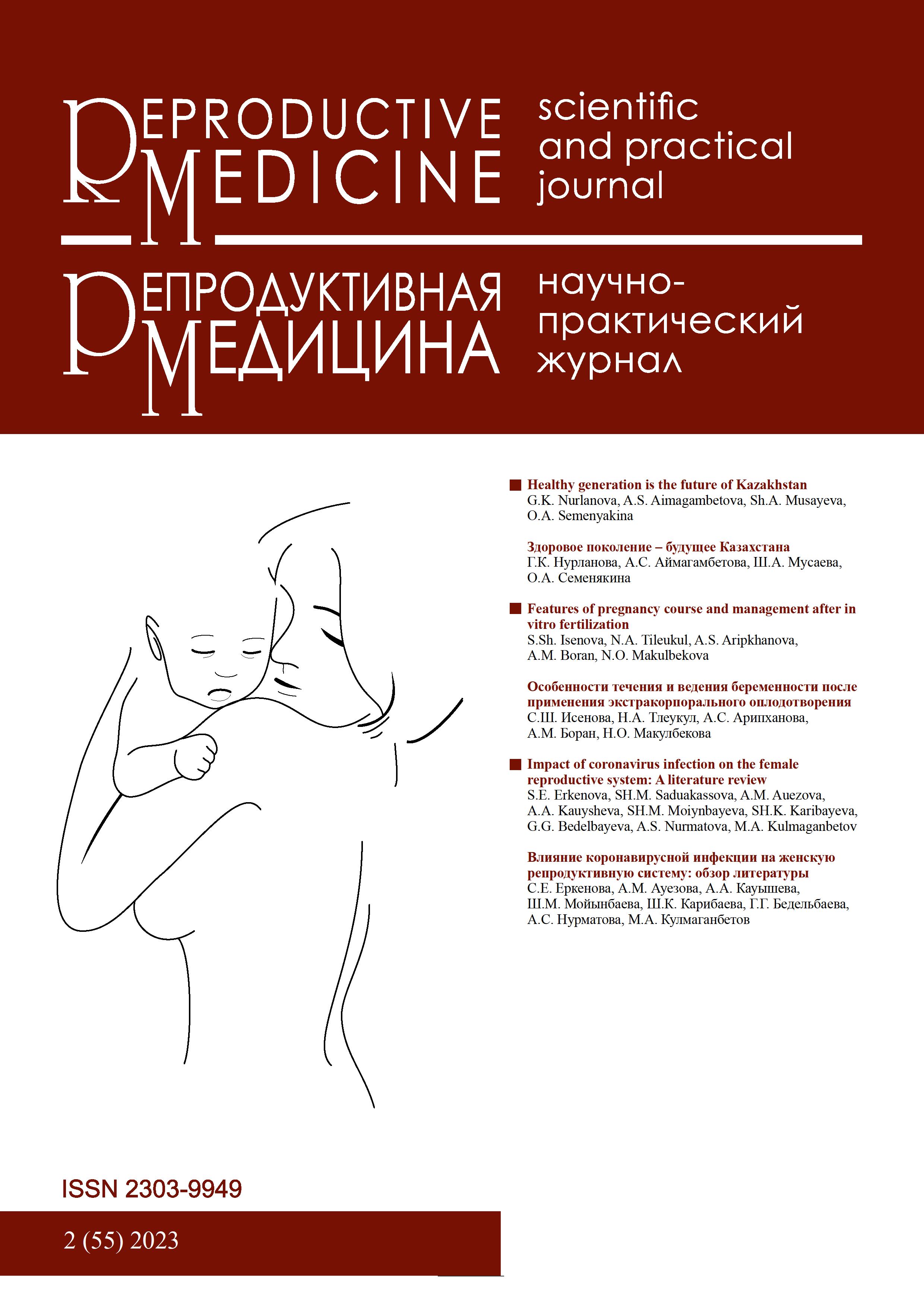Duration of folic acid intake and risk of gestational diabetes mellitus
DOI:
https://doi.org/10.37800/RM.2.2023.68-75Keywords:
folic acid, gestational diabetes mellitus, lipid profileAbstract
Relevance: Among pregnant women registered for pregnancy, long-term folic acid intake is expected, which raises concern about possible side effects for both the mother and the fetus.
The study aimed to find the relation between the duration of folic acid intake and the risk of developing gestational diabetes mellitus (GDM) in patients and to predict the directions and prospects for further research.
Materials and methods: This prospective study involved 147 pregnant women aged 16-18 weeks who were observed in the City Polyclinic No. 1 of Karaganda (Kazakhstan) from August 2018 to April 2020. The relationship between folic acid intake, lipid profile, and the risk of developing GSD was analyzed using linear and logistic regression models.
Results: The incidence of GDM in participants was 12.3%. We observed a U-shaped relationship between the duration of folic acid intake and the risk of developing GDM. Women who did not take folic acid and those who took folic acid for > 90 days had a higher incidence of GDM than those who took folic acid for ≤ 60 days. Moreover, the lipid profile positively correlated with the duration of folic acid intake and the risk of developing GDM. After adjusting for demographic characteristics, nutrient intake, and lipid profile, the odds ratio of GDM at folic acid supplementation for >90 days compared to folic acid supplementation for <=60 days were 3.45 (95% CI: 1.01-11.08).
Conclusion: This study indicates a positive association between long-term folic acid supplementation, second-trimester lipid profiles, and the risk of developing GDM. Further research is needed to check a larger sample of patients of different ages, BMI, and parity to test the causal relationships and the main mechanisms affecting the development of GDM.
References
Guariguata L., Linnenkamp U., Beagley J., Whiting D.R., Cho N.H. Global estimates of the prevalence of hyperglycaemia in pregnancy // Diabetes Res. Clin. Pract. – 2014. – Vol. 103. – P. 176-85. https://doi.org/10.1016/j.diabres.2013.11.003
Ovesen P.G., Jensen D.M., Damm P., Rasmussen S., Kesmodel U.S. Maternal and neonatal outcomes in pregnancies complicated by gestational diabetes. a nation-wide study // J. Matern. Fetal Neonatal Med. – 2015. – Vol. 28. – P. 1720-1724. https://doi.org/10.3109/14767058.2014.966677
Mitanchez D., Yzydorczyk C., Siddeek B., Boubred F., Benahmed M., Simeoni U. The offspring of the diabetic mother-short- and long-term implications // Best Pract. Res. Clin. Obstet. Gynaecol. – 2015. – Vol. 29. – P. 256-69. https://doi.org/10.1016/j.bpobgyn.2014.08.004
Xu Y., Shen S., Sun L., Yang H., Jin B., Cao X. Metabolic syndrome risk after gestational diabetes: a systematic review and meta-analysis // PLoS One. – 2014. – Vol. 9. – P. e87863. https://doi.org/10.1371/journal.pone.0087863
Da S.R.P., Kelly K.B., Al R.A., Jacobs R.L. Novel insights on interactions between folate and lipid metabolism // Biofactors. – 2014. – Vol. 40. – P. 277-283. https://doi.org/10.1002/biof.1154
Chittiboyina S., Chen Z., Chiorean E.G., Kamendulis L.M., Hocevar B.A. The role of the folate pathway in pancreatic cancer risk // PLoS One. – 2018. – Vol. 13. – P. e0193298. https://doi.org/10.1371/journal.pone.0193298
Finer S., Saravanan P., Hitman G., Yajnik C. The role of the one-carbon cycle in the developmental origins of type 2 diabetes and obesity // Diabet. Med. – 2014. – Vol. 31. – P. 263-72. https://doi.org/10.1111/dme.12390
Christensen K.E., Mikael L.G., Leung K.Y., Lévesque N., Deng L., Wu Q. High folic acid consumption leads to pseudo- MTHFR deficiency, altered lipid metabolism, and liver injury in mice // Am. J. Clin. Nutr. – 2015. – Vol. 101. – P. 646-58. https://doi.org/10.3945/ajcn.114.086603
Gomes S., Lopes C., Pinto E. Folate and folic acid in the periconceptional period: recommendations from official health organizations in thirty-six countries worldwide and WHO // Public Health Nutr. – 2016. – Vol. 19. – P. 176-189. https://doi.org/10.1017/S1368980015000555
Crider K.S., Devine O., Hao L., Dowling N.F., Li S., Molloy A.M. Population red blood cell folate concentrations for prevention of neural tube defects: Bayesian model // BMJ. – 2014. – Vol. 349. – P. g4554. https://doi.org/10.1017/S1368980015000555
Cawley S., Mullaney L., Kennedy R., Farren M., McCartney D., Turner M.J. Duration of periconceptional folic acid supplementation in women booking for antenatal care // Public Health Nutr. – 2017. – Vol. 20. – P. 371-379. https://doi.org/10.1017/S1368980016002585
Yan J., Zheng Y.Z., Cao L.J., Liu Y.Y., Li W., Huang G.W. Periconceptional folic acid supplementation in Chinese women: a cross-sectional study // Biomed Environ. Sci. – 2017. – Vol. 30. – P. 737-748. https://doi.org/10.3967/bes2017.099
ZhuB., GeX., Huang K., Mao L., Yan S., Xu Y. Folic acid supplement intake in early pregnancy increases risk of gestational diabetes mellitus: evidence from a prospective cohort study // Diabetes Care. – 2016. – Vol. 39. – P. e36-e37. https://doi.org/10.2337/dc 15-2389
Lai J.S., Pang W.W., Cai S., Lee Y.S., Chan J.K.Y., Shek L.P.C. High folate and low vitamin B12 status during pregnancy is associated with gestational diabetes mellitus // Clin Nutr. – 2018. – Vol. 37. – P. 940-947. https://doi.org/10.1016/j.clnu.2017.03.022
Chmurzynska A., Malinowska A.M., Twardowska-Rajewska J., Gawecki J.// Elderly women: homocysteine reduction by short-term folic acid supplementation resulting in increased glucose concentrations and affecting lipid metabolism (C677T MTHFR polymorphism) // Nutrition. – 2013. – Vol. 29. – P. 841-844. https://doi.org/10.1016/j.nut.2012.09.015.
Trimmer E.E. Methylenetetrahydrofolate reductase: biochemical characterization and medical significance // Curr. Pharm. Des. – 2013. – Vol. 19. – P. 2574-2593. https://doi.org/10.2174/1381612811319140008.
Zhao M., Yuan M.M., Yuan L., Huang L.L., Liao J.H., Yu X.L. Chronic folate deficiency induces glucose and lipid metabolism disorders and subsequent cognitive dysfunction in mice // PLoS One. – 2018. – Vol. 13. – P. e0202910. https://doi.org/10.1371/journal.pone.0202910
Downloads
Published
How to Cite
Issue
Section
License
The articles published in this Journal are licensed under the CC BY-NC-ND 4.0 (Creative Commons Attribution – Non-Commercial – No Derivatives 4.0 International) license, which provides for their non-commercial use only. Under this license, users have the right to copy and distribute the material in copyright but are not permitted to modify or use it for commercial purposes. Full details on the licensing are available at https://creativecommons.org/licenses/by-nc-nd/4.0/.





